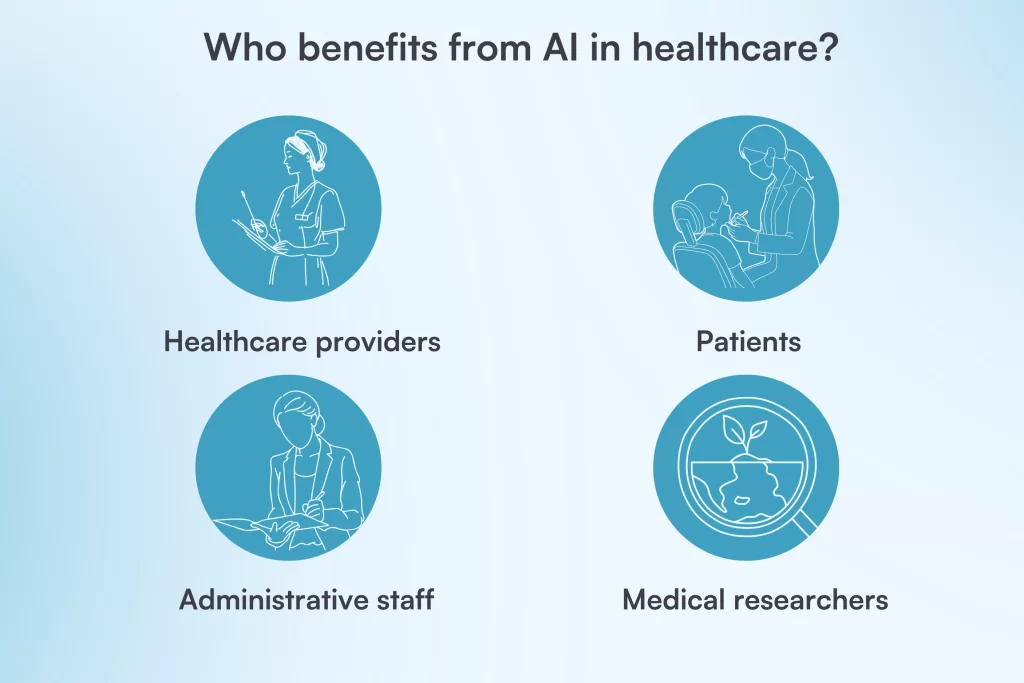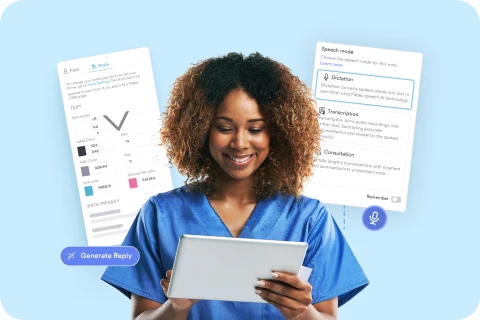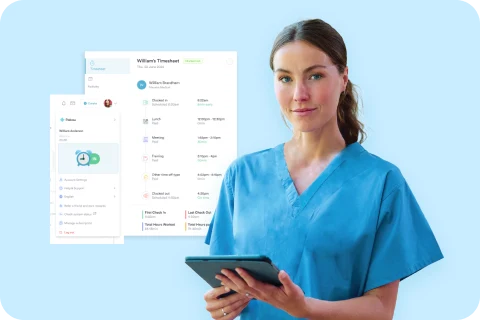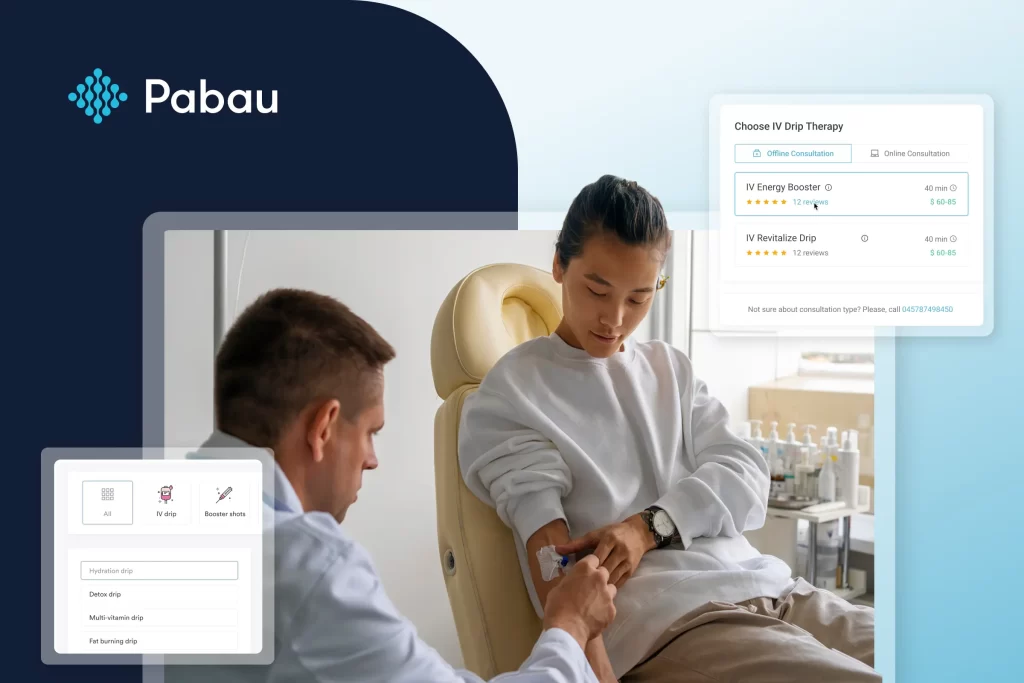Being a medical professional in the healthcare industry isn’t the easiest job in the world, so using any help you can get is a smart call.
This is where AI comes in. It’s a clever way to ease busy workloads and help with routine simple patient management and operational tasks.
In fact, AI can help physicians:
- Diagnose diseases earlier and more accurately
- Create more personalized treatments plans
- Reduce the time spent waiting for care
- Save costs on recruitment
However, as with any new and emerging technologies, some people will jump right in and others, rightfully so, will have reservations.
Let’s unpack the pros and cons so you come away knowing how AI can make your work life easier and, more importantly, where you should avoid it.
The pros of AI in healthcare
Did you know that 75% of top healthcare companies are either testing or preparing to expand the use of Generative AI across their operations?
This wouldn’t be the case if AI weren’t extremely beneficial, so let’s first look at AI’s pros.
Improved efficiency and automation
Instead of having to dedicate hours each week to administrative tasks or hiring someone to take care of them for you, there’s a quicker solution: AI.
With AI, you’ll be able to automate mundane tasks across your business and spend those extra hours on something that’s more important – patient care.
For example. you could use AI during the booking process to handle simple questions from interested leads, and hopefully get them to convert!
Remember: AI is there to help you — not replace you, as Dr Harry Singh, founder and CEO of the Botulinum Toxin Club, would confirm.
AI-powered appointment management
Did you know that you can minimize no-shows and cancellations if you start using AI for appointment management?
You can set up fully automated appointment bookings confirmations and reminders so that every client receives these after booking, without you having to send them manually. This has the power to save a huge amount of time.
This way, your team can focus on more high-value tasks – such as supporting patients with complex queries – instead of simply managing your calendar.
Enhanced patient communication and record-keeping
You can also take it to the next level by using AI for record-keeping.
Implementing AI for this specific task can save a lot of time. However, because it’s such an important area of any healthcare business, it’s important to do it right.
Let’s take patient record-keeping as an example.
Medical professionals are often stuck taking notes during consultations and appointments, which mean they aren’t as present in these conversations as they probably want to be. Eye contact isn’t going to be great, right?
It also means they have to rush to write up notes afterwards (often at the end of the day) which may lead to information being missed off or inaccurately captured.
However, you can use a medical spa AI for this. Simply record your patient-practitioner conversations. Then, use AI to either transcribe the full conversation verbatim or generate a concise, organized summary with all the key points. Easy!
👉 Introducing Pabau’s AI Scribe tool
Convert long treatment notes into concise summaries with just a single click. Record dictations or transcribe audio files to capture everything that was said during the appointment and ensure it’s transcribed or summarized.
Our AI Scribe will become your personal assistant, helping you save time in between appointments and be more present with your patients.
Improved reputation management and client engagement
The list of admin tasks at a busy clinic simply keeps on growing.
Luckily, smart technology can help with a couple more things on your business’s to-do list, such as improving client engagement and reputation management.
With AI-driven tools, you and other clinicians will be able to respond to customer reviews much more quickly than you would doing it manually.
Having templates you use for each review doesn’t always work since different customers have different opinions and experiences. So, instead of wasting time thinking about how to answer each one, simply run it through AI.
You can still review for tone and quality, of course, while speeding up client engagement and ensuring your customers feel heard and respected.
Personalized treatment plans
AI tools can analyze patient data that you already have stored in their client records.
In other words, you can use the information you have about a patient hand in hand with AI tools to create personalized treatment plans based on your medical notes.
AI can summarize notes and provide medication recommendations, and even alert you to potential contraindications, allergies, and risks. However, it goes without saying, the final decision should always require human oversight.
Ultimately, instead of having to read through numerous notes from your previous appointments, you’ll have it all in a single place, concise and easy to skim through.
Enhanced diagnosis and accuracy
Multiple studies have recently shown how AI can help diagnose patients earlier and with greater accuracy.
For example, in a study at Lund University in Sweden, AI-assisted mammogram readings detected cancer in 6.1 out of every 1,000 women, compared to 5.1 per 1,000 with traditional readings.
If you consider having to wait for a diagnostician to be able to read the results, as opposed to AI technology giving almost immediate real-time data, cutting down on time is a major bonus.
Cost savings and resource optimization
In addition to all the benefits of the use of these systems we’ve mentioned so far, there’s one more we need to consider: reducing operational costs.
For example, with a built-in AI tool, you wouldn’t necessarily have to hire someone to handle scheduling and booking – you could simply hand it over to AI instead. The same goes for marketing. You can use AI to populate your website, respond to customer reviews, or even write service descriptions for you.
For example, AI can help in cutting down costs related to readmission. These systems are a powerful tool when it comes to getting the right diagnosis on the first try, and readmission due to a misdiagnosis is a major factor in saving some money.
The cons of AI in healthcare
As amazing as AI might be, there are always two sides to every coin.
Artificial intelligence definitely has the power to take a lot off your plate, but the human factor remains a crucial factor – especially in the healthcare industry.
Potential for inaccuracies without human oversight
AI tools require appropriate training and monitoring in order to give correct and unbiased results. This is where human oversight comes into play.
Machine learning and deep learning are complex processes that require a lot of time and a lot of time and data feeding, and scientists can’t confirm that AI models are there yet in terms of providing completely accurate and unbiased information.
Social variables
Artificial Intelligence is smart, but it doesn’t always “get” the human side of healthcare.
Factors like cultural background, education level, income, and access to care can all impact a person’s health, but these systems might not fully consider these when making recommendations for treatments and so on.
This can lead to treatment plans that don’t fit a patient’s real-life circumstances, which can potentially widen existing healthcare disparities.
Cybersecurity risks
With AI handling sensitive medical data, cybersecurity is a massive concern, and security risks in the healthcare industry are always lawsuits waiting to happen.
AI-driven healthcare systems can be prime targets for cyberattacks, leading to data privacy breaches that put patient privacy at risk.
That’s why strong security measures — like encryption and regular system updates — are a must to keep personal health information safe.
Possibility of over-reliance
AI can make healthcare more efficient, but there’s a risk of physicians relying too much on it.
If suggestions from these systems are taken at face value without human oversight, mistakes can happen.
Plus, too much AI-based automation could reduce the personal touch that’s so important in patient care. You want AI-driven communications to look and feel personal, and that can be achieved by clever targeting using data.
However, the fact remains that AI should support healthcare professionals but never replace their judgement.
Interoperability issues with existing systems
Not all healthcare software is built with AI in mind.
If a medical practice’s existing systems don’t integrate well with AI solutions, it can cause headaches — like missing data, workflow disruptions, or expensive upgrades.
Before adopting AI, healthcare providers need to ensure it works smoothly with their current technology.
Who benefits from AI in healthcare?
AI in healthcare is making life easier for everyone involved.

- For patients
AI means faster and more accurate care. Physicians can diagnose conditions earlier, leading to quicker treatments and better outcomes.
AI-powered chatbots and virtual assistants also help answer simple questions about booking, pricing, and logistics, such as “What are your opening hours?”. This can help get answers to patients faster, which is a better experience.
- For healthcare providers
AI reduces errors and saves time. It can analyse patient data using the medical information you have stored in your EMR or CRM, and flag potential issues such as allergies. It even predict health risks before they become serious.
While is isn’t something that would replace the judgement of physicians and nurses, it can function as a safely net to catch any details that may be missed.
- For administrative staff
There are benefits for administrative staff, too AI can help to streamline processes for taking bookings, sending appointment confirmations and reminders, and lots more. You can even use it to respond to customer reviews if you wish!
AI tools have the power to automate these tasks and even cut out some of the human error, where sending manual communications can be forgotten.
- For medical researchers
AI’s ability to analyse massive amounts of datasets quickly is critical.
This speeds up drug discovery, helps to identify disease patterns, and gives faster medical advancements that could (hopefully) lead to new treatments and cures.
All this combined helps to provide better patient experiences and enhanced patient outcomes — every practitioner’s dream.
Harness the benefits of AI in your practice with Pabau
AI is changing healthcare. It can improve efficiency, handle routine patient management tasks, and take the pressure off busy medical teams.
But it’s not perfect. AI comes with risks if it’s not used correctly.
That’s why choosing the right AI applications and the best medical software is so important. Pabau is an all-in-one practice management software that helps med spas with booking and scheduling, patient record management, marketing, and more.
It also has a built-in AI solution, Echo AI, which provides you with all the benefits of AI. Use it to save time on patient record management, supporting diagnosing and prescribing, marketing and operations tasks, and more.
Want to see how it can help your practice? Book a demo today!










